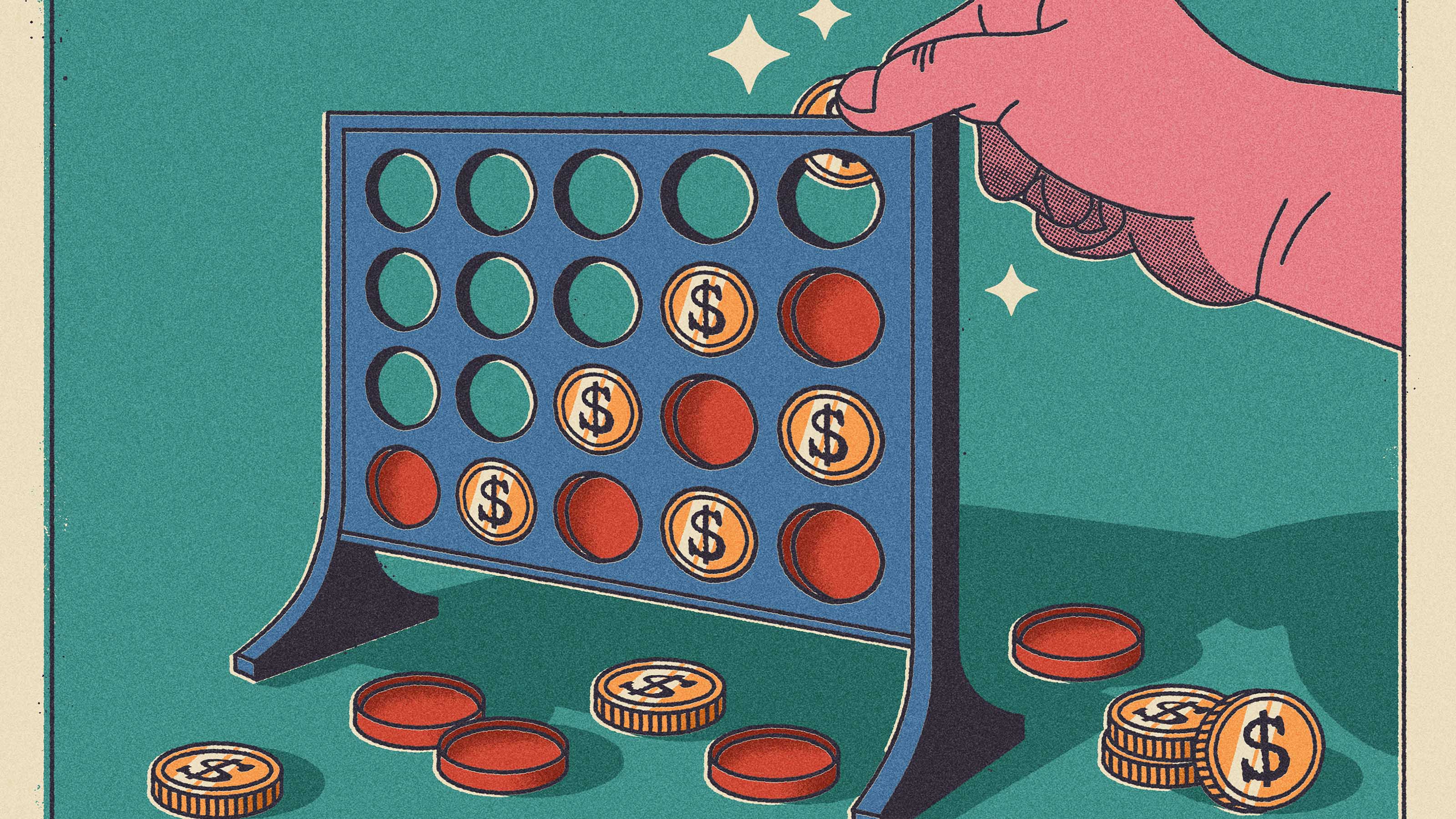2 Surprising Bargain Stocks for Value Investors
Nu Skin and Herbalife look tempting for investors looking to get in on the cheap.

Profit and prosper with the best of Kiplinger's advice on investing, taxes, retirement, personal finance and much more. Delivered daily. Enter your email in the box and click Sign Me Up.
You are now subscribed
Your newsletter sign-up was successful
Want to add more newsletters?

Delivered daily
Kiplinger Today
Profit and prosper with the best of Kiplinger's advice on investing, taxes, retirement, personal finance and much more delivered daily. Smart money moves start here.

Sent five days a week
Kiplinger A Step Ahead
Get practical help to make better financial decisions in your everyday life, from spending to savings on top deals.

Delivered daily
Kiplinger Closing Bell
Get today's biggest financial and investing headlines delivered to your inbox every day the U.S. stock market is open.

Sent twice a week
Kiplinger Adviser Intel
Financial pros across the country share best practices and fresh tactics to preserve and grow your wealth.

Delivered weekly
Kiplinger Tax Tips
Trim your federal and state tax bills with practical tax-planning and tax-cutting strategies.

Sent twice a week
Kiplinger Retirement Tips
Your twice-a-week guide to planning and enjoying a financially secure and richly rewarding retirement

Sent bimonthly.
Kiplinger Adviser Angle
Insights for advisers, wealth managers and other financial professionals.

Sent twice a week
Kiplinger Investing Weekly
Your twice-a-week roundup of promising stocks, funds, companies and industries you should consider, ones you should avoid, and why.

Sent weekly for six weeks
Kiplinger Invest for Retirement
Your step-by-step six-part series on how to invest for retirement, from devising a successful strategy to exactly which investments to choose.
Ouch! I was prepared for some volatility when I invested in a skin-care company that relies on direct selling. But I really didn’t expect to get skinned alive so soon after I bought the stock. For those of us who consider ourselves value investors, however, suffering through what we hope are temporary setbacks is just part of the game.
Perhaps I should back up and explain. In mid July, I bought 148 shares of Nu Skin Enterprises (symbol NUS), which sells skin creams and other anti-aging products. At $67.80, the stock had already been cut in half since the start of the year and was selling at 11 times projected year-ahead earnings. The shares looked cheap. Unfortunately, they got much cheaper, falling to as low as $43.50 after Nu Skin reported disappointing second-quarter results. The stock closed at $48 on August 7.
Nu Skin, based in Provo, Utah, uses multilevel marketing to move its products. Like Herbalife (HLF), which uses a nearly identical business model, Nu Skin has suffered through and survived numerous investigations into its sales practices.
From just $107.88 $24.99 for Kiplinger Personal Finance
Become a smarter, better informed investor. Subscribe from just $107.88 $24.99, plus get up to 4 Special Issues

Sign up for Kiplinger’s Free Newsletters
Profit and prosper with the best of expert advice on investing, taxes, retirement, personal finance and more - straight to your e-mail.
Profit and prosper with the best of expert advice - straight to your e-mail.
The most recent inquiry was conducted by the government of China, where Nu Skin derived $1.4 billion in revenue (43% of total sales) last year. The investigation caused Nu Skin to halt sales and recruiting efforts in China for several months. However, analysts apparently underestimated the extent of the damage. When they saw the latest financial results, they started rapidly cutting their earnings estimates. But the share price has fallen far more precipitously than those estimates, and Nu Skin now sells for just 9 times projected year-ahead profits. Granted, estimates may come down more, but the stock still looks awfully cheap.
Sure, I wish I’d bought at $43.50. But I don’t mind buying into companies that have been severely punished for a temporary earnings shortfall. Would I buy it today at $48? Probably. So I’m going to sit still and hope that all of the bad news is out.
China, alas, is not the only issue weighing on Nu Skin’s stock. The shares are apparently feeling the fallout from the long-running battle between Herbalife and hedge fund manager Bill Ackman, who claims that the weight-loss and nutrition-supplement company is a Ponzi scheme. Ackman’s fund sold short $1 billion worth of Herbalife shares last year, betting that they would lose value. Regardless of whether Ackman is right or wrong, the sales practices he criticizes are common to most of the multilevel marketing industry.
Multilevel marketing companies can be dicey prospects because they usually involve selling products to salespeople, who use the products in demonstrations to sell more products to their friends. Salespeople also recruit other salespeople, who also buy the products. If a company’s products are stale, ineffective or simply unpopular, sales are limited to the company’s own salespeople. Without new customers, a multilevel marketer collapses.
Right focus. I don’t think either Nu Skin or Herbalife is on the verge of collapse. Before Nu Skin’s China-related stumble, both outfits had been enjoying strong revenue and earnings increases. It’s hard to pull off those kinds of numbers for long stretches (both companies are more than 30 years old) through a Ponzi scheme unless you’re completely cooking the books. That seems unlikely in these instances. And although I think Herbalife, at $50, is also a bargain, I prefer Nu Skin because of its focus on anti-aging products, which resonates with me and my baby boomer friends as we try to convince the world that we’re still in our thirties. Unfortunately, the stock itself is doing little for my youthful appearance; its recent drop has already given me a few new gray hairs.
Profit and prosper with the best of Kiplinger's advice on investing, taxes, retirement, personal finance and much more. Delivered daily. Enter your email in the box and click Sign Me Up.

-
 Nasdaq Leads a Rocky Risk-On Rally: Stock Market Today
Nasdaq Leads a Rocky Risk-On Rally: Stock Market TodayAnother worrying bout of late-session weakness couldn't take down the main equity indexes on Wednesday.
-
 Quiz: Do You Know How to Avoid the "Medigap Trap?"
Quiz: Do You Know How to Avoid the "Medigap Trap?"Quiz Test your basic knowledge of the "Medigap Trap" in our quick quiz.
-
 5 Top Tax-Efficient Mutual Funds for Smarter Investing
5 Top Tax-Efficient Mutual Funds for Smarter InvestingMutual funds are many things, but "tax-friendly" usually isn't one of them. These are the exceptions.
-
 The Most Tax-Friendly States for Investing in 2025 (Hint: There Are Two)
The Most Tax-Friendly States for Investing in 2025 (Hint: There Are Two)State Taxes Living in one of these places could lower your 2025 investment taxes — especially if you invest in real estate.
-
 The Final Countdown for Retirees with Investment Income
The Final Countdown for Retirees with Investment IncomeRetirement Tax Don’t assume Social Security withholding is enough. Some retirement income may require a quarterly estimated tax payment by the September 15 deadline.
-
 How to Beef Up Your Portfolio Against Inflation
How to Beef Up Your Portfolio Against Inflationinvesting These sectors are better positioned to benefit from rising prices.
-
 Taxable or Tax-Deferred Account: How to Pick
Taxable or Tax-Deferred Account: How to PickInvesting for Income Use our guide to decide which assets belong in a taxable account and which go into a tax-advantaged account.
-
 Smart Investing in a Bear Market
Smart Investing in a Bear Marketinvesting Here's how to make the most of today’s dicey market.
-
 How to Open a Stock Market Account
How to Open a Stock Market Accountinvesting Investing can be fun, but you need a brokerage account to do it. Fortunately, it’s easy to get started.
-
 The Right Dividend Stock Fund for You
The Right Dividend Stock Fund for YouBecoming an Investor Dividend stock strategies come in many different flavors. Here's what to look for.
-
 Alternative Investments for the Rest of Us
Alternative Investments for the Rest of UsFinancial Planning These portfolio diversifiers aren't just for the wealthy.